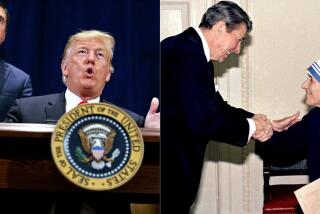Despite Defeat, Reagan Vows He’ll Fight Again : Many Wonder Whether Road Bill Setback Will Set Pattern for Final Months of His Presidency
- Share via
WASHINGTON — President Reagan, undeterred only one day after what was widely viewed as a major defeat in Congress’ override of his veto of the highway bill, declared Friday that it was “a battle well worth waging” and signaled future confrontations, vowing: “There will be more.”
But many wonder whether such legislative setbacks will become a habit for Reagan, a symptom of weakened effectiveness and leadership stemming from an impression that he is a lame duck awaiting the end of his presidency, now less than 22 months away.
Nevertheless, several analysts in and out of government--including a member of the Senate’s Democratic leadership--view Reagan’s fight on the highway bill as a successful political exercise. After repeated and official criticism of his hands-off management style, the battle demonstrated his willingness to become personally involved in the workings of his office.
Coming Battles
The question of whether Reagan has lost the ability to sway Congress, particularly since the Democrats regained control of the Senate last fall, could be answered in the coming weeks on other major legislation he opposes. The outcomes of battles on the following fronts may show whether the loss on the highway bill was only an isolated incident or a sign of things to come:
--A two-year, $38.3-billion measure funding federal housing programs approved by the Senate Tuesday and sent to the House. The bill is opposed by Reagan, and a senior White House official indicated Friday that it is a possible target for a veto. Sen. William L. Armstrong (R-Colo.) predicted that a veto of the measure would be sustained because 27 senators voted against it--10 more than the 17 opposing the highway bill when it originally was approved and only seven fewer than the number needed to sustain a veto.
--An $11.3-billion supplemental spending bill approved by the House Appropriations Committee that would provide funds for a number of programs whose needs were not anticipated when the fiscal 1987 spending bills were approved. Unlike the highway and housing bills, which the Reagan Administration has attacked as spending more than the President sought, the supplemental bill would provide less than he wants for defense and foreign aid programs.
--A bill providing funds for programs for the homeless, which has been approved by the House and could come up in the Senate as early as Monday. The Administration opposes the bill, but White House officials have acknowledged privately that legislation intended to assist the homeless might be politically difficult to veto.
Pugnacious Promise
On Friday, at a White House ceremony marking the sale of Conrail stock to the public, Reagan repeated his pugnacious promise to veto bills not to his liking.
If Reagan continues on this path, Senate Majority Leader Robert C. Byrd (D-W.Va.) predicted, “I’m afraid we’re in for a summer of discontent and confrontation.”
Nelson W. Polsby, a political scientist at Harvard University’s John F. Kennedy School of Government, agreed. And, in view of Reagan’s loss of political clout as a result of the Iran- contra affair, Polsby said that “one would expect a lot of stalemate.”
But, he said in a telephone interview, Reagan’s effort to block the $88-billion highway bill was an example of “straightforward politics.”
Had Reagan chosen to accept a bill to which he strongly objected out of fear that a loss would become a political embarrassment, Polsby said, “I’d have said he’s letting shadow dominate substance, being scared off by virtue of what people may say, appearing more interested in controlling the spin than actually pitching the ball.”
Reagan Called Vigorous
Even Sen. Alan Cranston of California, a member of the Democratic leadership in the Senate, said that Reagan would stand to gain in the long run. “It shows he’s vigorous and fighting,” Cranston said Thursday before the President’s dramatic, though unsuccessful, trip to the Senate to lobby 13 recalcitrant Republican senators.
In the White House before Reagan’s journey to Capitol Hill, a Republican lobbyist and former Reagan aide said, “There was a genuine feeling against his going.”
But this source, speaking on condition of anonymity, said that “the President wanted to do it. He felt he needed to demonstrate personal involvement. Although he took one on the chin, and it looks like a personal defeat and a step on the road to lame-duck status, that’s a difficult conclusion to draw if he’s perceived as actively involved.”
This concern about demonstrating the President’s involvement reflects the White House effort to portray him as actively engaged in his duties--an effort under way since the presidential commission headed by former Sen. John Tower (R-Tex.) sharply criticized Reagan as playing an insufficient role in the management of his White House.
The commission was appointed by Reagan to examine the operation of the White House in the wake of the effort to sell weapons to Iran and the suspected diversion of profits to the anti-Sandinista rebels fighting in Nicaragua.
One-Vote Margin
Still, Democrats, trying to squeeze every ounce of victory out of the one-vote margin that enacted the highway bill Thursday over Reagan’s veto, expressed wonder that the President chose to fight them on the measure, when he was ultimately unsuccessful--and failed to sway even one of the Republican senators who meant the difference between victory and defeat.
“Is that the kind of political judgment we’ll see in the next 20 months?” asked an aide to the Democratic leadership.
However, when asked why the White House chose such a difficult battle to make its point, one White House official said: “There wasn’t any easy one coming down the road. You didn’t have much to choose from. If you put it off, when do you draw the line and say: ‘Enough is enough’?”
Staff writer Karen Tumulty contributed to this story.
More to Read
Get the L.A. Times Politics newsletter
Deeply reported insights into legislation, politics and policy from Sacramento, Washington and beyond. In your inbox twice per week.
You may occasionally receive promotional content from the Los Angeles Times.










